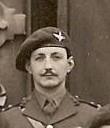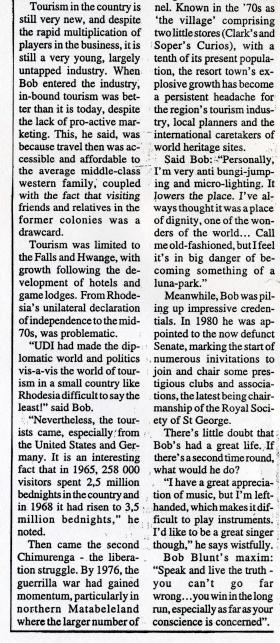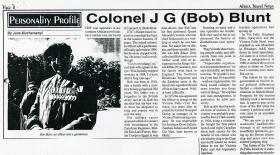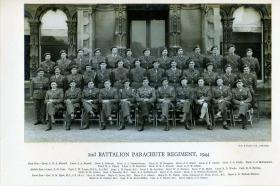John Graham Blunt was born on the 19 February 1918, and came from Grantham in Lincolnshire.
He originally enlisted as 4857896. Private. John Graham Blunt in the Leicestershire Regiment on the 25th February 1936, just after his 18th birthday. He served with the 4th Battalion, which was a Territorial Army, and in that same year it was rerolled to searchlights as the 44th (The Leicestershire Regiment) Anti-Aircraft Battalion, Royal Engineers.
His service between 1936 and 1941 is not known, but in 1941 he volunteered for Britain’s Airborne Forces, and joined the 11th Special Air Service Battalion, and carried out his basic parachute training at RAF Ringway on Whitley aircraft. In August 1941 the order came through that the Battalion was to be converted from the Commando role to that of a Parachute Infantry Battalion, of the new 1st Parachute Brigade. By this time he was a Corporal and a spare NCO in ‘S’ Company.
Along with six Officers and eighty six Other Ranks of the 1st Parachute Battalion, he undertook Parachute Course No 1 Advanced at RAF Ringway, 4 – 11 January 1942. On this they carried out the following:
(a). Advanced training in synthetic and aircraft drill and practice in packing and unpacking containers.
(b). Section descents with arms containers under Section Leaders.
(c). Platoon descents with arms containers under Army Commanders from aircraft flying in formation.
(d). Tactical ground exercises after landing.
(e). Night descents from the balloon.
He then requested to become an Officer, and was left behind on Rear Party when the battalion, and the rest of the 1st Parachute Brigade went to North Africa to take part in Operation ‘Torch’. He went to 161 Officer Cadet Training Unit on the 8 December 1942, and was then granted an emergency commission into the Royal Fusiliers on the 2 April 1943, as a Second Lieutenant. On the 8 April he was transferred to the Parachute Regiment, Army Air Corps.
It was now that the military system showed its inflexibility as the newly commissioned ‘Bobby’ Blunt, as he was known to all in the Army, was sent on another Parachute Course. He was to attend Parachute Course 61 (19 April to 3 May 1943) as the officer in charge, but having been sent earlier and started with Course 60 on the 12 April, he was replaced on Course 61 by Major. Reed, who then did not appear! After two days of ground training he eventually went on to carry out a night balloon and two aircraft descents.
He was posted to North Africa, and joined the 2nd Battalion on the 2 June 1943. He was just in time to take part in Operation ‘Fustian’ in Sicily, on the 13 – 14 July 1943, where he was the Regimental Signals Officer (RSO). He continued in that post for Operation ‘Slapstick’, the landings at Taranto in September 1943. Whilst in Italy he was promoted to war Substantive Lieutenant on the 20 October 1943.
Back in the United Kingdom on the 11 February 1944 he was involved in a road traffic accident, and then on the 11 March 1944, he was admitted to Grantham civil hospital and was ‘struck off strength’ for 28 days.
By mid-April 1944 he was back with the battalion, and then on the 12 June he was appointed to the rank of Unpaid Acting Captain, at the same time assuming command of Home and Rear Details personnel.
When Lt ‘Bobby’ Blunt was not acting as the RSO his place was taken by Lieut ‘Tom’ Ainslie.
For Operation ‘Market’ he served as the RSO for the 2nd Parachute Battalion, and was wounded and captured at Arnhem Bridge. He spent some time in St Elizabeths Hospital before being sent on to Stalag 11B, POW Camp at Falingbostel in Germany. He was then sent to Oflag 79, at Brunswick, Lower Saxony, and was released from captivity in April 1945.
He continued to serve after the war, but in July 1949 he was transferred to the Regular Army Reserve of Officers, Regimental List (The Royal Leicestershire Regiment).
Then in October 1953 he was transferred to the Regular Army Active List, with a short service commission, relinquishing the rank of Honorary Captain with seniority of Lieutenant, as of the 9 July 1949. In March 1954 he was posted to The King’s African Rifles, Nyassaland Battalions, where he served until November 1957. He then transferred to the Regular Army Reserve of Officers, on the Regimental List, and was granted the rank of Honorary Captain upon full retirement on the 19th October 1961.
John Graham ‘Bobby’ Blunt died in Harare, Zimbabwe, July 1997, aged 79.
FROM THE AFRICA TRAVEL NEWS. 1993.
PERSONALITY PROFILE. By June Muchemenyi.
Few tour operators in the southern African travel trade have neither met nor heard of Colonel J.G. (Bob) Blunt.
UTC’s Harare-based executive consultant has been in the tourism business 25 years. The retired Colonel, an officer and a gentleman, officially quit work in 1984, but he never stopped working. He doesn’t call it work, though. “I love everything I do”, said Bob with a gleam in his eye. “Had I actually stopped working in 1984, I’d have died a long time ago”.
Bob was born in 1918, into a family with a military history going back 300 years. His father was a Brigadier in the British Army and at 18, Bob too decided that the best way to show his allegiance to King and Country was to join the Army.
His military career spanned a third of a century with secondments to the Parachute Regiment, Middle East Land Forces, British Troops in Egypt. It was then-abouts that Bob met his first girlfriend, a Queen Alexandra’s nurse, who was chief bridesmaid at a wedding at which he was best man. He asked her to dinner, and three months later, she was Mrs Blunt. Duty called and Bob had to move further south with an assignment in the King’s African Rifles (Nyasaland), and his family went back to England. The Northern Rhodesian Regiment and the Zambian Army in the late sixties signalled the end of his military career. Well, at least officially.
In 1972 he was appointed the officer in charge of the Victoria Falls Civil Defence, two years after he joined the United Transport Group as manager of its Victoria Falls touring company. He was responsible for Southern Cross Safaris, Zambesi Safaris and United Car Hire, later known as Hertz. Running an Army and a tour operation are similar, Bob once said to me as we discussed the history of Zimbabwean tour operators. They’re both about moving people safely and efficiently from one point to another, he said. “Impeccable organisation and administration”, he says decidedly, are the bottom line. “It wouldn’t matter if you had 10 waterfalls – without organisation, the thing would collapse. An army teaches you those sorts of things”. Discipline and man-management, in particular, he adds pensively.
Bob recalls that the earliest form of tourism in this country was probably practised by Percy Clark as early as 1904, using a rickshaw. He bought his first petrol launch and eight Canadian birch bark canoes for the benefit of his clients who travelled by ship to the Cape and north inland on steam trains to see the Victoria Falls and the legendary Zambezi.
Tourism in the country is still very new, and despite the rapid multiplication of players in the business, it is still a very young, largely untapped industry. When Bob entered the industry, in-bound tourism was better than it is today, despite the lack of pro-active marketing. This, he said, was because then was accessible and affordable to the average middle-class western family, coupled with the fact that visiting friends and relatives in the former colonies was a draw-card.
Tourism was limited to the Falls and Hwange, with growth following the development of hotels and game lodges. From Rhodesia’s unilateral declaration of independence to the mid 70’s , was problematic. “UDI had made the diplomatic world and politics vis-à-vis the world of tourism in a small country like Rhodesia difficult to say the least!” said Bob. “Nevertheless, the tourists came, especially from the United States and Germany. It is an interesting fact that in 1965, 258, 000 visitors spent 2,5 million bed-nights in the country and in 1968 it had risen to 3,5 million bed-nights”, he noted.
Then came the second Chimurenga – the liberation struggle. By 1976, the guerrilla war had gained momentum, particularly in northern Matabeleland where the larger number of tourism operations had sprung up. In Victoria Falls, Elephant Hills, Sprayview and the Victoria Falls Hotel were attacked as was Makololo in Hwange; A&K shut down its local operations. All came to a virtual halt. Then at independence in 1980, it seemed the sun was about to shine on Zimbabwe’s tourism once more. But not so.
The failure by the new government to resolve local political differences fuelled a volatile security situation in Matabeleland. Prospects for the tourism industry took a downward turn. It came to pass at the close of the 80’s when the country’s political arch-rivals came to an amicable agreement. “We are now in an upward curve”, said Bob, who through it all remained steadfastly optimistic, giving up his British citizenship and never once considered jumping ship.
The future of the Victoria Falls, however is something that concerns the colonel. Known in the 70’s as ‘the village’ comprising two little stores (Clark’s and Soper’s Curios), with a tenth of its present population, the resort town’s explosive growth has become a persistent headache for the region’s tourism industry, local planners and the international caretakers of world heritage sites.
Said Bob: “Personally I’m very anti bungie-jumping and micro-lighting. It lowers the place. I’ve always thought it was a place of dignity, one of the wonders of the world. Call me old-fashioned, but I feel it’s in big danger of becoming something of a luna-park”.
Meanwhile, Bob was piling up impressive credentials. In 1980 he was appointed to the now defunct Senate, marking the start of numerous invitations to join and chair some prestigious clubs and associations, the latest being the chairmanship of the Royal Society of St George.
There’s little doubt that Bob’s had a great life. If there’s a second time round, what would he do? “I have a great appreciation of music, but I’m left handed, which makes it difficult to play instruments. I’d like to be a great singer though”, he says wistfully.
Bob Blunt’s maxim: “Speak and live the truth – you can’t go far wrong – you win in the long run, especially as far as your conscience is concerned”.
Click here to see the Cornelius Ryan interview with John G Blunt
Created with information kindly donated by R Hilton. Profile image taken from the Airborne Assault Archives.
Read More




Latest Comments
There are currently no comments for this content.
Add Comment
In order to add comments you must be registered with ParaData.
If you are currently a ParaData member please login.
If you are not currently a ParaData member but wish to get involved please register.